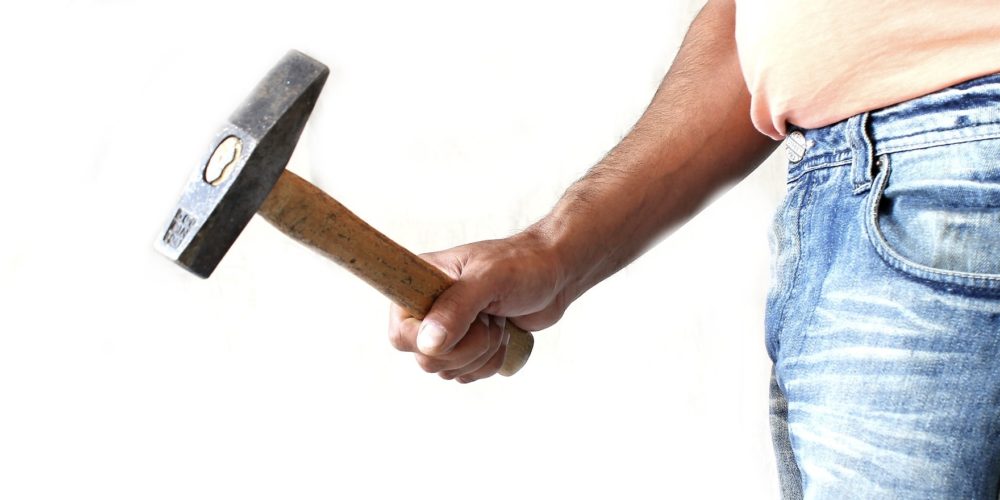The man with the hammer is about to disturb you

The man with the hammer is ready to start work.
He is employed on a construction site. His job is to attach metal sheets to steel girders. It is a very noisy job. A high-decibel racket is about to ensue. The site is on a quiet residential road in Nairobi. The time is 12 midnight – he works the night shift. If he starts hammering, he will awaken all the neighbours – children sleeping before a school day; employees who have to start work early; even the old and infirm.
Will he start hammering?
Of course he will. The man with the hammer lives on the poverty line. He is paid on a piecemeal basis. If he does not complete his work tonight, he does not get paid. If he does not get paid, his family do not eat tomorrow.
So – bang, bang, bang.
The man with the hammer can’t be deterred by the noise pollution caused to others; he is fulfilling a very basic need. What about his boss, the site contractor? This person will certainly not be happy if the metal sheets are not up by tomorrow. His deadline may slip, and so will his payments. The contractor will scream blue murder if the timetable is compromised. Neighbours? To hell with the neighbours.
Perhaps the property developer who employs the contractor has a reputation to maintain and will show some concern? It all depends on who the neighbours are. If they are wealthy, influential folk, perhaps they can make some trouble for the developer. In that case some caution may be needed; noisy night shifts can be avoided. But if the neighbours are just ordinary middle-class types – what will they do? Make a bit of noise on social media? Yawn.
But we have authorities, do we not? There are people assigned the responsibility of maintaining the peace and regulating noise pollution. The residents can appeal to them, surely? Try it and see. As I have written here before, too many of our regulatory authorities are either fast asleep in protecting ordinary rights; or wide awake in embracing extortion. Again, if you are influential, you may succeed in getting your nights and your rights back. The average Joe and Joan, however, can report all they like. Bang, bang, bang.
What happened to us and our sense of community? How did we become this ugly, self-centred band of self-interested parties who fill their stomachs and coffers, to hell with everyone else? At the level of the stomach it is perhaps understandable; but at the level of the super-rich contractor and developer? Everyone is in a race to bank their big money. The norm is to feather your own bed rather than to worry about the wellbeing or comfort of anyone else.
What we have lost over the decades are the exceptional people. The contractor who has a bigger deal going on than just polluting the environment with noise and debris. The developer whose purpose is to leave behind outstanding buildings in harmony with nature. The factory owner who will not spew effluent into the river. The nightclub manager who soundproofs his premises. The government functionary who will not see rules broken. We once had enough such figures to prevent the descent. But they were largely outnumbered and eliminated. Today, we live amongst the boors who only know the small deal of self-gain.
We live in communities because to do so is the essence of being human. But we can’t just coexist; we must also cooperate. Our success as a species comes in being able to live and work and thrive with others, not as lone beasts. Every person doing what they want without a thought for anyone else is not just a failure in decency; it kills the advancement of society. We live on a shared planet in shared spaces. If we forget how to share, we perish.
I have written it before, and I will repeat it until it sinks home: “Any society that lets the most avaricious in its ranks run its businesses unchecked knows what comes next. Workers exploited, corners cut, standards breached, laws broken, customers hoodwinked, environments polluted, good businesses rendered uncompetitive. This is why we need fair and simple regulations, and why we need to have them adhered to.”
We also need the good people to rediscover their moral compass. To recognize that not every gain must come at someone else’s expense; not every ill-earned dollar is worth banking. Otherwise we come to the end of this precious existence having spent a lifetime harming and annoying others. What a waste of humanity.
Meanwhile, here comes the hammer. Bang, bang, bang.
(Sunday Nation, 13 December 2020)

Buy Sunny Bindra's new book
The X in CX
here »
Popular Posts
- Where are you rushing to—your funeral?June 29, 2025
- The map will appear—once you start walking.July 6, 2025
- How to spot a real thinkerJune 15, 2025
- Built the app, forgot the flowJune 22, 2025















